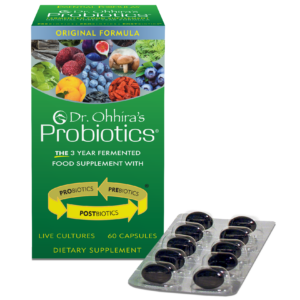Along with fiber in your diet and water consumption, sleep is one of those things you know you need but probably don’t get enough of. The National Sleep Foundation recommends that adults get 7 to 9 hours a night. Globally, over 51% of people get less than that. Now, here’s the good news—you can do something about it by considering your gut microbiome.
The gut microbiome is what’s living inside each of use—trillions of microorganisms, like viruses, fungi, bacteria, and a host of other life forms. While a healthy gut microbiome can certainly positively affect your physical health, it can also affect your mood, producing up to 90% of serotonin, which is the body’s neurotransmitter for happiness.
Most of the microbes in your microbiome are helpful, while others are potentially harmful. Most work well together in a symbiotic relationship, resulting in sundry health benefits. There are pathogenic, or disease-promoting, microbiota in smaller numbers, but in healthy bodies they coexist with the good, helpful microbes.
Chicken or the Egg?
If you’re wondering how your gut microbiome has to do with sleep, it’s important to note that a growing amount of scientific research suggests that there is a direct correlation between both. Each affect the other. For instance, your gut microbiome affects your circadian rhythm, which is what naturally regulates your sleep/wake cycle and repeats based on the 24-hour-long rotation of our planet. Along with sleep, the circadian rhythm regulates our energy and appetite. Also, it influences the composition of the gut microbiome. And that, in turn, regulates our circadian pathways. It’s kind of a chicken-or-the-egg scenario.
Think about the commonly known things that disrupt our circadian rhythms, such as jet lag, shift work, delayed bedtimes, and early morning wake-up calls. Aside from feeling exhausted, they affect our gut microbiome. Several studies have shown that sleep disorders, such as insomnia and sleep apnea, greatly affect it.
As an example, people with sleep apnea have altered gut microbiomes that result in a decreased production of postbiotic metabolites, such as short-chain fatty acid (SCFAs). SCFAs can reduce the risk of obesity, heart disease, type 2 diabetes, and inflammatory diseases. Yes, they are important. And that is just one example.
Connecting the Dots
Sleep issues result in decreased oxygenation, which negatively affects the gut microbiome. And with a weakened microbiome, there is an increased risk of many diseases.
If you’ve ever scoffed at the thought of sleeping 7-9 hours a night, consider this―people who don’t get enough sleep can have a much higher incidence of a number of health issues, including heart disease, high blood pressure, breathing problems, urinary problems, chronic pain, neurologic diseases, and gastrointestinal problems. Yes, sleep is that important.
If your sleep problems are due to sleep apnea, the risks can be even greater, including, among other things, increased risks of stroke, coronary artery diseases, and diabetes.
How to boost your microbiome
It’s important that people with sleep issues, especially sleep apnea, should seek professional help. As previously mentioned, there are some very serious side effects that can result. The link connecting them and a number of serious diseases is significant. However, there are many things you can do to help boost and elevate your microbiome.
Along with getting more sleep, you should try to lower stress levels, stay hydrated, and eat less high-sugar, high-fat, and processed foods. And here’s a great start―take Dr. Ohhira’s Probiotics from Essential Formulas.
The award-winning Original Formula and Professional Formula are hand-made in Japan from powerful probiotics, vegetable extracts, mushrooms, selected herbs, fruits, and seaweed. They are all naturally fermented for three to five years, with a true respect of nature and reverence for science. During the prolonged fermentation period, the probiotic bacteria in the Dr. Ohhira’s formulas create those important health-supporting postbiotic metabolites, thus assuring superior digestive and immune support.







